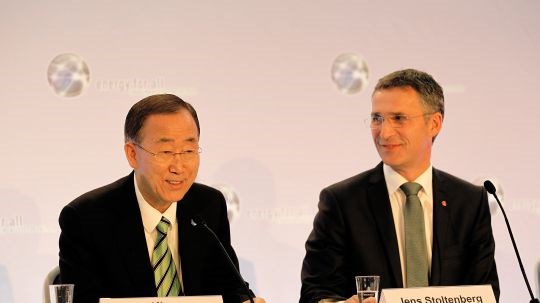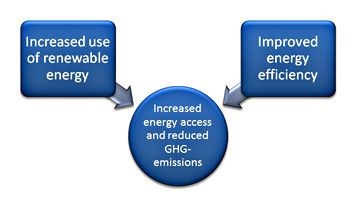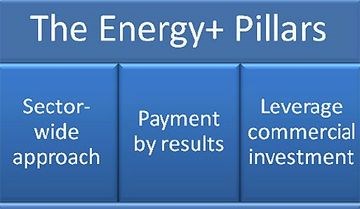About Energy+
Historical archive
Published under: Stoltenberg's 2nd Government
Publisher: Ministry of Foreign Affairs
Article | Last updated: 09/07/2013

What
The International Energy and Climate Initiative Energy+ was launched by Norwegian Prime Minister Jens Stoltenberg and UN Secretary General Ban Ki-moon during the Energy for All Conference in Oslo on 10 October 2011. The Energy+ initiative aims to increase access to sustainable energy services and reduce greenhouse gas emissions. These two objectives link the topics of energy and climate in a development perspective.
Why
Without improved energy efficiency (EE) and increased use of renewable energy (RE), total greenhouse gas emissions will increase. Countries will be “locked in” to unsustainable sources of energy, making it impossible to achieve the goal of limiting average global warming to 2oC degrees by the end of the century, as called for by the UN Framework Convention on Climate Change (UNFCCC). This may have catastrophic impacts on both nature and society.

Substantial investments will be needed to increase access to sustainable energy through improved energy efficiency and renewable energy. Official Development Assistance (ODA) alone will not be enough to meet this need. However, by using ODA strategically, it is possible to encourage commercial investments and realise renewable energy potential.
How
Energy+ has three distinct pillars to achieve the goals of increased energy access and reduced emissions: A sector-wide approach, payment by results and measures to leverage commercial investments (read more here).

Energy+ focuses on the sector level rather than the project level. That is to say, it focuses on the energy sector as a whole, rather than on individual projects. This includes contact with national authorities and helping to draw up national energy plans. By focusing on the energy sector as a whole, it is possible to achieve greater impacts than by focusing on individual projects. In this respect, Energy+ is an initiative, which seeks to increase access, energy efficiency and renewable energy by engaging in dialogue with stakeholders and national authority decision-makers.
Who
Nearly fifty countries and organisations have signed up to the Energy+ Partnership. The plus in the name signifies the intention to scale up financing and deployment of modern energy sources to the poor while avoiding increased greenhouse gas emissions. The Energy+ Partnership is voluntary and open to all interested actors who endorse the guiding principles.
Energy+ supports the goals and timelines of the UN Secretary-General’s Sustainable Energy for All (SE4All) initiative.
The goals of SE4All to be achieved by 2030 are:
- To ensure universal access to modern energy services
- To double the global rate of improvement in energy efficiency
- To double the share of renewable energy in the global energy mix
- Statement by Minister of International Development Heikki Eidsvoll Holmås (New York 24 September 2012)